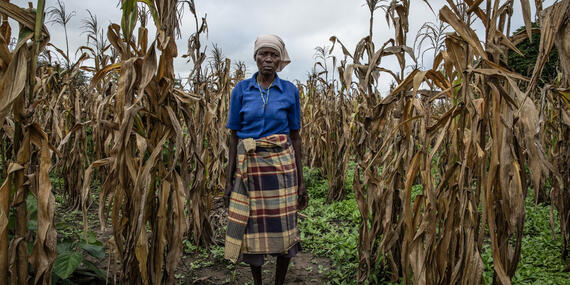Today's top news: Occupied Palestinian Territory, CERF allocation, Southern Africa

Occupied Palestinian Territory
OCHA says that attacks on humanitarian personnel, missions and humanitarian facilities are further limiting the delivery of life-saving aid in Gaza.
The most recent attacks on the UN include the one on the World Food Programme convoy on 28 August.
OCHA warns that these incidents not only endanger the lives of aid workers – with this ongoing crisis being the deadliest on record for the UN – but also limit their capacity to help the more than 2 million people who are engaged in a daily struggle for their survival.
The Acting Under-Secretary-General for Humanitarian Affairs, Joyce Msuya, said yesterday to the Security Council: “Civilians in Gaza are hungry. They are thirsty. They are homeless. They have been pushed beyond the limits of endurance – beyond what any human being should bear.”
OCHA says that, today, the Israeli military announced once more that they would allow the return of Palestinians and aid organizations into areas previously subjected to evacuation orders. This follows a similar notice issued yesterday for other areas.
Combined, these are the first such notices made since the beginning of the war.
Nearly 90 per cent of the Gaza Strip’s space remains affected by 40 of unreversed evacuation orders issued since last October.
With the latest announcement that return would be allowed, multiple aid organizations who have had to relocate and abandon premises are now preparing to return, particularly to the evacuated humanitarian hub in Deir al Balah.
Meanwhile, OCHA says that in August, the number of humanitarian missions and movements within Gaza that have been denied access by Israeli authorities has almost doubled, compared with July.
Between 1 and 29 August, out of the 199 planned humanitarian missions coordinated with the Israeli authorities for northern Gaza, only 74 were facilitated. The rest were either denied, impeded, or cancelled due to logistical, operational, or security issues. In southern Gaza, out of 372 coordinated humanitarian movements, just 173 were facilitated.
On the West Bank, OCHA warns that the continuation of Israeli operations that use lethal military tactics seemingly exceed law enforcement standards.
Today, such operations have continued mostly in the Jenin governorate, and according to what OCHA receives, the death toll since Wednesday has now reached 19 Palestinians, including two children. People have been hit by airstrikes, missiles and sniper fire, including in densely populated urban areas.
OCHA has now mobilized a group of humanitarian partners from the UN and beyond to visit some of the affected areas over the weekend to assess damage to homes and infrastructure. This will be done in close coordination with UN Relief and Works Agency for Palestine Refugees in the Near East. Together, they stand ready to provide a response based on what people need the most.
CERF allocation
The United Nations today released US$100 million from the Central Emergency Response Fund (CERF) to address critically underfunded emergencies in 10 countries in Africa, the Americas, Asia and the Middle East.
More than one third of this funding will go towards Yemen and Ethiopia, with the rest going to Myanmar, Mali, Burkina Faso, Haiti, Cameroon, Mozambique, Burundi and Malawi.
CERF funding is an emergency cash injection of last resort to avert the worst and save lives when other humanitarian funding is inadequate, said Acting Under-Secretary-General for Humanitarian Affairs Joyce Msuya. She stressed the urgent need for increased and sustained donor attention to these underfunded crises.
Southern Africa
OCHA says that the Southern Africa is experiencing severe food insecurity due to an El Niño-induced drought. More than 1.1 million children under the age of five are facing severe acute malnutrition in 12 countries.
Also, more than 20 million people are experiencing crisis levels of hunger in Madagascar, Malawi, Mozambique, Zimbabwe, Angola, Zambia, Namibia, Eswatini, Tanzania, Lesotho and Botswana.
This comes as several parts of the region have been affected by the worst dry spell in more 100 years with the lowest rainfall in the middle of the rainy season in 40 years.
The UN and our partners have launched Flash Appeals for four countries affected by El Niño – including Malawi, Zambia, Zimbabwe and Mozambique – aiming to reach 14.5 million people.
This year, CERF has allocated $29.4 million for the drought response in Southern Africa, including to Madagascar, Zimbabwe, Malawi, Angola, Zambia and, most recently, Namibia.
